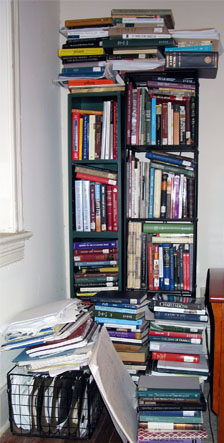 That’s a photo of the bibliography of Becoming Charlemagne; I shot it the morning the final manuscript flew like the Winged Victory of Samothrace to my editor’s desk in New York. Large-scale maps scrawled with timelines and trade routes, teetering towers of library books—by that point, my workspace looked like a cross between the lair of a serial killer and Tom Hanks’ bedroom in Mazes and Monsters. So this past Thursday night, I was both honored and relieved to sit on a research-themed panel hosted by James River Writers, which taught me that this obsessive, it-puts-the-lotion-in-the-basket behavior is, at least among authors, something close to normal.
That’s a photo of the bibliography of Becoming Charlemagne; I shot it the morning the final manuscript flew like the Winged Victory of Samothrace to my editor’s desk in New York. Large-scale maps scrawled with timelines and trade routes, teetering towers of library books—by that point, my workspace looked like a cross between the lair of a serial killer and Tom Hanks’ bedroom in Mazes and Monsters. So this past Thursday night, I was both honored and relieved to sit on a research-themed panel hosted by James River Writers, which taught me that this obsessive, it-puts-the-lotion-in-the-basket behavior is, at least among authors, something close to normal.
My co-panelists were Phaedra Hise, journalist and author of the meticulously reseached Pilot Error: Anatomy of a Plane Crash, and Maggie Stiefvader, whose young-adult novels about homicidal faeries and “werewolf nookie” are informed by her college study of medieval languages. (Her children are named Wulfnoð and Æðelðryð. She is hardcore.) Our trusty moderator, fantasy writer Bill Blume, did a great job. Bill writes the funny and trippy webcomic The Wildcat’s Lair, where he contends with stuffed dragons and technicolor cats in their natural habitat: the gaming table.
Writing is often dreary work. You’re up all night, flipping between the Monumenta Germaniae Historica and a twilight block of Felicity episodes (don’t judge me), paranoid that you might not meet your deadline, wondering if anyone is going to care about the ninth-century Islamic pistachio trade. Publishing a book rarely brings the wealth, the fame, or the power over life and death that many aspiring writers believe it will. When your book hits the shelves, it’s a happy day, but life just doesn’t change all that much.
…and then, once in a while, you’re invited to yak it up at a writers’ event, and you retire to a pizza joint for a late night of unrepeatable stories with smart, funny people, and you begin to understand the value of your 300-page calling card beyond the reviews and royalty statements. Writers like to gripe and whine, but when it comes to this one benefit, don’t let authors tell you otherwise, not even my fellow recluses. The social aspect, unlike the process of writing itself, is even more fun than you think it will be.

That sounds like fun. I’m glad you had a good time.
I could care about the 9th century Islamic pistachio trade.
LikeLike
Oh lor’. I hope she lets the girl go by Audrey, but I see little escape for the boy….
LikeLike
Her children are named Wulfnoð and Æðelðryð. She is hardcore.
I died. DIED.
I don’t think medievalists are allowed to be funny. Are they?
LikeLike